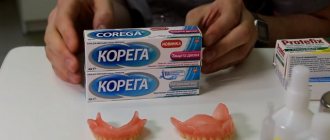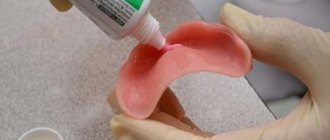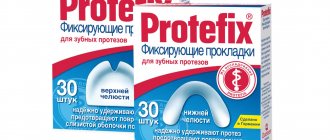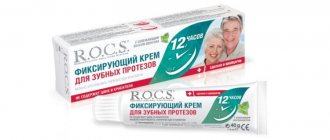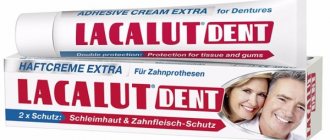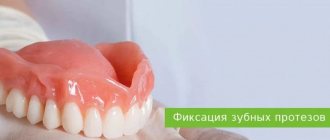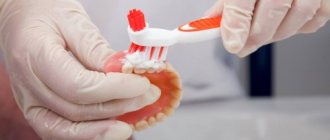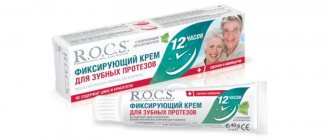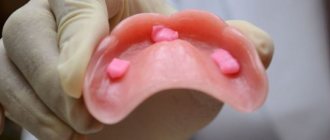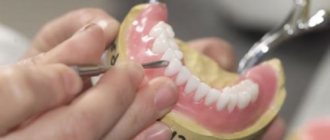Cleaning removable dentures is one of the main stages in oral care. Since over time, bacteria accumulate on the material from which the device is made, which can result in inflammation and infection of the gum tissue. In addition, using the right products will help keep your artificial teeth in perfect condition for a long time. Special tablets work best and most effectively when cleaning removable appliances. Since pharmacies offer a large selection of drugs from different manufacturers, it can sometimes be difficult to understand.
Why are fixing agents needed?
The main and only purpose of creams or gels for dentures is to securely hold these products in the mouth. In order for the orthopedic structure to be better attached to the jaw, an additional layer is needed between it and the gums, which increases the tightness of the prosthesis and has adhesive properties.
The principle of operation of such drugs is extremely simple: upon contact with a liquid substance (saliva or water), the substances contained in the fixing composition swell, due to which the volume of the adhesive layer increases and fills the voids between the prosthesis and the sky.
However, ensuring tight fixation is not the only function that such a product performs. Creams and gels for dentures often have bactericidal properties, therefore they prevent inflammation and prevent infection of the mucous membrane by pathogenic microflora.
Also, some fixatives are designed to combat halitosis, which often occurs in patients who neglect proper oral hygiene.
The range of this sector is not limited to 2-3 items, although all preparations for dentures have similar properties and effects.
Manufacturers must include in the composition of such creams and gels:
- polypeptides;
- essential oils;
- flavorings.
When choosing this product, it is recommended to give preference to products from trusted manufacturing companies that have an impeccable reputation among consumers. Some of these are GlaxoSmithKline and Queisser Pharma GmbH and Co. KG. Their products are hypoallergenic and do not cause irritation to the mucous membranes, since they do not contain chemical fragrances or harmful additives.
Helps prevent gum disease
Wearing removable dentures is always associated with some inconveniences; first of all, they can cause irritation, injury and chafing of the mucous membrane. As a result, this will lead to the occurrence of various inflammatory processes. The most relatively harmless of them is stomatitis, when various ulcers appear in the mouth and the tongue hurts. All this gives a person a lot of anxiety.
Tongue hurts
But there are problems that are much more serious, for example, periodontal disease. This disease is associated with inflammation and destruction of the bone structures of the teeth. For those who still have some retained teeth in their mouth, this threatens their rapid loss. For those who suffer from complete edentia, subsequent implantation without the use of bone grafting becomes impossible. And this delays the time for returning to a full life.
So, Corega tablets remove about 99% of all bacteria in the mouth, so the chance of getting an inflammatory process in people using this product is reduced to zero.
Corega Series
The products, which are produced by the Irish manufacturer GlaxoSmithKline under the Corega series, promote reliable fixation of the denture, prevent damage to the gums, and prevent the orthopedic structure from shifting and food debris getting under it. All varieties of these creams for attaching dentures are available in 40 ml tubes and cardboard packaging.
The composition of Corega preparations includes the following components:
- sodium, magnesium, zinc salts of methylvenylethermaleic acids;
- silicon dioxide;
- gum;
- mineral oils;
- menthol;
- liquid paraffin.
Coreg products can be used to secure both partial and complete removable dentures. The undoubted advantage of this series of dental products is the ability to choose a cream with a menthol additive, which maintains fresh breath, or a neutral taste.
All varieties of Corega cream are in demand:
- Corega neutral. This denture fixation product is suitable for people prone to allergic reactions to food dyes, flavor enhancers and flavorings. Unlike other dental creams, this one is not felt at all by a person while eating, and does not mix with the odors of other products. Corega neutral cream costs about 225-275 rubles.
- Corega extra strong. This product contains plant extracts that give freshness to your breath. Thanks to the menthol contained, it is possible to muffle gag reflexes, which often occur when trying to install or remove a prosthesis. The price of this cream does not differ from the cost of the previous one.
- Corega is refreshing. Unlike Coreg Extra Strong, this one has a subtle, laid-back minty flavor that freshens breath and eliminates minor inflammation on the roof of your mouth. The fixing agent costs about 250 rubles.
Protefix or Corega are better than most analogues, according to user reviews. Such preparations are used sparingly: as a rule, a single spot application on the inner surface of the prosthesis is quite enough for hermetically sealed fixation with the mucous membrane of the palate for 14-16 hours.
It is necessary to store such products for orthopedic structures of the oral cavity at a temperature of no more than 20 ⁰C in a place protected from direct sunlight.
All varieties of Corega cream have no special contraindications or restrictions for use. You can purchase any product from this series at the pharmacy. Corega creams for dentures are included in the list of over-the-counter medications, which indicates the absence of harmful effects of their components when used.
Such fixing compounds are allowed to be used by pregnant and lactating women, since they are not absorbed into the bloodstream, which means that they are not capable of harming the fetus or infant.
The only condition under which the use of Coreg is prohibited is an allergic reaction to any substance in the product. If the first signs of individual intolerance appear, you should stop using the drug until you consult a doctor.
Based on the general description of Coreg fixing agents, their properties and application features, several main advantages can be identified:
- Convenient release form - small 40 ml tubes you can always take with you and use the cream anywhere.
- Not all similar series of products are represented by drugs with a neutral taste.
- There is no health risk if a small amount of cream is accidentally swallowed.
- Coregas act softly and delicately, without causing irritation to the gums.
- The thick consistency of the creams facilitates long-term economical use.
- Coreg products are in an affordable price range.
The indisputable disadvantage of preparations for fixing Corega dentures, according to some users, is the rapid wear of dental structures, which leads to a reduction in their service life, and the development of sensitivity of the teeth and soft tissues of the oral cavity to the effects of hot or too cold drinks and dishes.
Protefix Series
Protefix, unlike Corega, is a product of a well-known German brand specializing in the production of care products for dental structures. The drug is completely safe for health.
Protefix cream has the property of increased fixation due to better adhesion to the surface of the mucous membrane. The drug guarantees maximum stability of the prosthesis and does not allow even minimal displacement for several hours.
The consistency of Protefix cream allows you to avoid overuse. The drug contains no harmful substances.
It contains:
- sodium and calcium salts - necessary for the absorption of liquid;
- carboxymethylcellulose – provides the necessary viscosity;
- Vaseline – moisturizes the area of contact with the prosthesis;
- paraffin – softens the mucous membrane;
- silicon dioxide - necessary to create a homogeneous mass of cream;
- Hydroxybenzoate is an antiseptic component;
- aloe extract is an anti-inflammatory substance.
Protefix or Corega (it is better to choose between these two products after consulting with your doctor) operate on the same principle: the drugs securely fix dentures, filling the space between the mucous membrane and the plastic structure with their creamy mass.
Thanks to such fixing compounds, the possibility of food particles getting under the denture is completely eliminated. The risk of injury to the soft tissues of the oral cavity is also minimized.
Protefix is produced in tubes of different sizes - 23 and 47 g.
An indication for the use of a means for fastening dentures may be any of the following circumstances:
- there is copious secretion of saliva;
- incomplete shrinkage of the orthopedic product occurred;
- there are mechanical irritations, rubbing of the soft tissues of the gums, palate, and tongue.
Despite its safe composition, there are some contraindications to the use of Potefix:
- allergy to the components contained;
- intolerance to aspirin and drugs based on it;
- the presence of ulcerative lesions in the oral cavity.
Taking into account the individual needs of people who use dentures, Protefix manufacturers have expanded their product line of fixing products. Each Protefix product differs not only in cost, but also in unique properties.
For example:
- Protefix is hypoallergenic - a cream that does not contain harmful dyes, taste and smell enhancers. Its presence in the oral cavity goes unnoticed in 99% of cases, so it is ideal for those who constantly wear dentures. Available in tubes with a capacity of 47 g, the price is in the range of 170-190 rubles.
- Protefix aloe vera - this option is ideal for patients with severe oral problems (swelling of the mucous membrane, hyperemia of the gums, ulcerations, chafing). Aloe extract relieves inflammation and promotes rapid healing of damaged areas. Protefix Aloe vera is sold in 40 ml tubes for 135-160 rubles.
- Protefix with mint – recommended for use in the initial stages of wearing dentures. The menthol contained in the composition cools irritated tissues and makes it easier to get used to the structure itself. The cost of a 47 g tube is 190-220 rubles.
- Protefix extra strong – its distinctive feature is the increased content of a substance that provides better adhesion to a specific area of the mucous membrane. This is the Protefix cream that dentists recommend using if a person uses prosthetic systems on both jaws. The price of a tube (24 g) is about 150 rubles.
The main advantages of the cream for fixing dentures Protefix are:
- makes it possible to eat any food with a guarantee of strong attachment of the prosthesis;
- has a relatively low cost;
- a widely available drug that is sold in any pharmacy;
- does not cause adverse reactions or allergies;
- It is allowed to use both moistened and dry orthopedic structures.
The disadvantages of Protefix creams include their relatively liquid consistency, which may cause untimely breakdown of fixing substances and a shortening of the period of action. If the dosage is exceeded, the possibility of damage to the mucous membrane of the stomach walls cannot be excluded.
Terms of use
Protefix is used in the same way as Corega cream or any other analogue. In order for the product to better fix the denture, it is necessary to carefully study the instructions from the manufacturer before use.
Corega
To maximize the effectiveness of Corega series creams, the orthopedic structure must be thoroughly rinsed and dried before being fixed in the oral cavity.
Also, before installing the prosthesis, it is necessary to brush your teeth so that unnoticed food debris and crumbs do not get into the space between the prosthesis and the gum and do not provoke tissue irritation or inflammation. Failure to comply with these basic hygiene rules can lead to tissue chafing, pain and discomfort.
Any of the Coreg creams are distributed along the dentition along the edge of the structure, squeezing out the product in small sections. The wrong solution is to use an excessive amount of adhesive: the excess cream will be noticeable on the surface of the gums and smile. In addition, such wasteful use of funds to fix the prosthesis will lead to the need to purchase it again.
The instructions for Corega drugs clearly describe the scheme for their use:
- Apply cream to the edges of a dry, clean denture using a dotted line.
- Then the structure should be installed in the oral cavity, in accordance with the characteristics of its structure.
- The prosthesis must be pressed firmly with your fingers and held for several seconds, then close your jaws.
To fix dentures, Corega must also be applied to the upper jaw in the center of the palate.
The manufacturer provides recommendations not only for installing artificial plates, but also for their correct removal. Before removing the prosthesis, it is necessary to complete all necessary hygiene procedures.
In order not to damage the structure, it must be carefully loosened, moving in opposite directions until it is completely disconnected. If the gluing is too strong, you need to lightly press your fingers on the gums in contact with the cheeks.
After removal, the denture should be cleaned in warm water. The manufacturer recommends using special products for cleaning dental plates (for example, Corega Bioformula tablets) and a toothbrush.
Correct use of Corega cream ensures strong fixation of the dental product. If you follow the instructions for use, the possibility of food debris getting under the prosthesis and injuring the mucous membrane is eliminated. On average, a 40 g tube is enough for 1 month of daily use.
However, in practice, judging by the reviews, the use of denture creams from the Corega series makes it possible to achieve ideal fastening of the structure for no more than 6-8 hours, after which a gap appears between the product and the gums. For a longer fixation, the cream consumption has to be increased, so 1 tube is usually not enough for a whole month.
To prevent discomfort from using the product, patients must follow simple precautions:
- It is not advisable to take dietary supplements or vitamin-mineral complexes while using Corega cream for dentures;
- while wearing a prosthesis, you should not drink too hot drinks (tea, coffee, broth);
- Self-adjustment of the dose is allowed at the discretion of the patient;
- increased activity of the salivary glands after application of the drug is not a contraindication to its use.
Protefix
In general, the scheme for using this tool is not fundamentally different from the use of analogues. At the same time, the manufacturer of Protefix cream advises patients to strictly adhere to the dosages specified in the instructions and the algorithm for removing dentures.
Protefix or Corega is best used in the morning, immediately after brushing your teeth. Hygienic manipulations must also be carried out with the dental structure itself.
When applying the fixing cream, the denture should be slightly damp:
- The plate must be turned upward with the side that will be attached to the soft tissues of the upper or lower jaw.
- When squeezing out the cream, the tube must be held straight in a vertical position.
- With light pressure, a little liquid will come out of the tube, which should be eliminated.
- Thick, homogeneous cream must be distributed pointwise, in thin short strips, moving from the middle to the edge of the product.
- Excess cream must be removed using a cotton swab soaked in vegetable oil.
If you need to ensure a longer fixation, the cream must be squeezed additionally onto the palatal area and, placing the structure in the appropriate place, be sure to press it with your fingers and hold for 10-15 s. After this, the patient should clench his jaws for 20–30 seconds, and then not open his mouth for another -10 minutes.
After each use of Protefix cream, it is important to wipe the neck of the tube dry and close it with the cap. Otherwise, the adhesive will quickly harden and become unusable. Moreover, the manufacturer even focuses users’ attention on the optimal position of the packaging when storing the drug: the tube should not lie horizontally.
Protefix or Corega interact better with perfectly cleaned dentures, so it is advisable to use such preparations only after complete removal of cream residues from previous use from the plate. For this purpose, the manufacturer of Protefix recommends using the Active Cleaner, available in tablets (a complete analogue of the Corega Bioformula product).
There is no confirmed information about cases of overdose with Protefix. Adverse reactions from this cream also occur in isolated cases, and, as a rule, are a consequence of individual intolerance to the components in the fixing cream.
How to use correctly
Usually, the denture, cleaned with a brush and dental floss, is placed in a solution (1 tablet per 150 ml of water) for 20 minutes. Depending on the brand, the amount of water, preparation and time for cleansing may vary, so read the instructions carefully.
Afterwards, the denture must be thoroughly rinsed to remove any remaining product and dried. You should not use the tablets if you notice cracks or chips on the surface of the prosthesis. In this case, you can only worsen the situation.
How often to apply
Cleaning with tablets at home should be done at least 2 times a week. This will ensure high-quality removal of bacterial plaque and eliminate the causes of unpleasant odor. It is also not a good idea to use tablets too often, as this can damage the crown material.
In order for the denture to last a long time, it is necessary to take it to the dental clinic for professional cleaning from time to time.
What do the means have in common?
There are a number of similarities between the Corega and Protefix series products:
- Neither product should be used if you have an allergic reaction.
- You can purchase preparations for fastening dental structures without a prescription, and they are sold not only in pharmacies, but also in specialized stores.
- The creams of the indicated series remain valid for 3 years from the date of manufacture, provided they are stored in a dry, dark place.
- The drugs are used without restrictions for pregnant and lactating women.
- Both Corega and Protefix need to be applied to the prosthesis in a thin layer: excess reduces the quality of fastening of the structure.
- There is no information about cases of overdose with these creams.
Extend the life of the device
This is a very important factor for those who by chance wear removable devices. On average, as dentists emphasize, a prosthesis can last about 5 years. But this is provided that you take good care of it throughout its entire service life. Basically, artificial teeth can become unusable after 2-3 years due to the fact that they have acquired an unsightly shade, become dirty, oxidized under the influence of bacteria, cause pain and unpleasant sensations, are out of order, broken, and so on. So, in order to prevent at least the first four points, you need to take care of them according to all the rules.
Of course, removable devices, no matter how well you take care of them, will have to be replaced after a maximum of 5 years, but this will have to be done because bone tissue subsides underneath them. And, in general, Corega tablets will help you avoid premature replacement, and will also protect you from inflammatory processes in the gums, which can directly affect your health.
Notice
: Undefined variable: post_id in
/home/c/ch75405/public_html/wp-content/themes/UltraSmile/single-item.php
on line
45 Notice
: Undefined variable: full in
/home/c/ch75405/public_html/wp-content /themes/UltraSmile/single-item.php
on line
46
Rate this article:
( 1 ratings, average: 5.00 out of 5)
prosthetics
Consulting specialist
Chorny Stanislav Vladimirovich
Doctor rating: 9.8 out of 10 (4) Specialization: Orthopedist Experience: 20 years
Comparisons and differences
Despite the same release forms, Corega and Protefix creams have different compositions. In addition, Corega can only be applied to a dry orthopedic plate. In this regard, Protefix wins: it is effective when used on both wet and dry products.
Protefix or Corega
Corega has more negative reviews about its use. Patients using this drug more often experienced nausea, irritation of the oral mucosa, and increased salivation. However, this does not allow us to make an unambiguous conclusion about which remedy is better. In addition, drugs from both manufacturers are capable of causing an allergic reaction.
Those who have used the products of the described brands note that Protefix, unlike Coreg, does not change its properties under the influence of hot food, and does not at all change its taste or smell. At the same time, Corega is not washed off with saliva; products from this series do not need to be stored in an upright position, since they have a thicker consistency and do not leak.
A unique feature of the Irish manufacturer’s series is Protefix aloe vera cream, which has not only anti-inflammatory, but also bactericidal properties.
At the same time, some patients complain that when used systemically, the product irritates the oral mucosa. To avoid these troubles, the manufacturer Protefix suggests purchasing additional powder and spacers that help fix the prosthesis for a longer period.
Before buying a drug for fixing dentures, Protefix or Corega, you should definitely consult with your treating orthopedic dentist. The doctor will advise which drug will work better and safer.
Review of the Protefix brand: how tablets help clean removable dentures
Article navigation
- Arsenal of Protefix products
- Release form and packaging of the drug
- Features of the cleaning composition
- How effective is the drug?
- Instructions for using tablets
- Features of application
- Safety precautions when using tablets
- How much do Protefix tablets cost?
Question for a specialist
No matter how high the quality of the material and production of removable dental structures, without careful care they quickly wear out and require replacement. Protefix (“Protefix”) are tablets that are specially created by the company of the same name to extend the life of dentures. Thanks to their special formula, removable products will retain their original shape and appearance longer.


